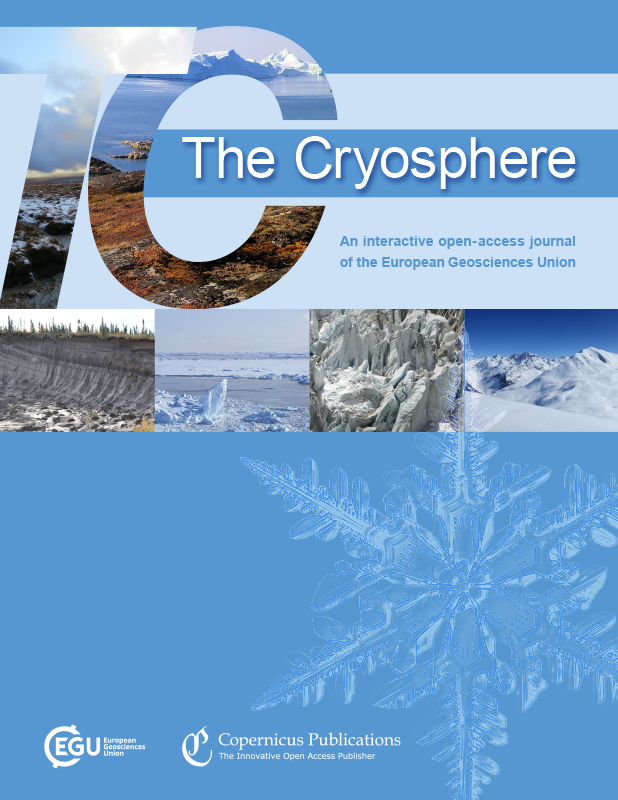Strategies for regional modeling of surface mass balance at the Monte Sarmiento Massif, Tierra del Fuego
IF 4.4
2区 地球科学
Q1 GEOGRAPHY, PHYSICAL
引用次数: 1
Abstract
Abstract. This study investigates strategies for calibration of surface mass balance (SMB) models in the Monte Sarmiento Massif (MSM), Tierra del Fuego, with the goal of achieving realistic simulations of the regional SMB. Applied calibration strategies range from a local single-glacier calibration to a regional calibration with the inclusion of a snowdrift parameterization. We apply four SMB models of different complexity. In this way, we examine the model transferability in space, the benefit of regional mass change observations and the advantage of increasing the complexity level regarding included processes. Measurements include ablation and ice thickness observations at Schiaparelli Glacier as well as elevation changes and flow velocity from satellite data for the entire study site. Performance of simulated SMB is validated against geodetic mass changes and stake observations of surface melting. Results show that transferring SMB models in space is a challenge, and common practices can produce distinctly biased estimates. Model performance can be significantly improved by the use of remotely sensed regional observations. Furthermore, we have shown that snowdrift does play an important role in the SMB in the Cordillera Darwin, where strong and consistent winds prevail. The massif-wide average annual SMB between 2000 and 2022 falls between −0.28 and −0.07 m w.e. yr−1, depending on the applied model. The SMB is mainly controlled by surface melting and snowfall. The model intercomparison does not indicate one obviously best-suited model for SMB simulations in the MSM.火地岛萨米恩托山地表物质平衡区域模拟策略
摘要本研究探讨了火地岛萨米恩托山(MSM)地表质量平衡(SMB)模型的校准策略,目的是实现区域SMB的真实模拟。应用的校准策略包括从局部单一冰川校准到包含雪流参数化的区域校准。我们应用了四种不同复杂程度的SMB模型。通过这种方式,我们研究了模式在空间上的可转移性、区域质量变化观测的好处以及增加包含过程的复杂性水平的好处。测量包括在斯基亚帕雷利冰川的消融和冰厚观测,以及整个研究地点的卫星数据的海拔变化和流速。通过大地质量变化和地面熔化观测,验证了模拟SMB的性能。结果表明,在空间中转移smb模型是一个挑战,并且通常的做法会产生明显的偏差估计。利用遥感区域观测资料可以显著提高模型性能。此外,我们已经证明,在达尔文科迪勒拉地区的SMB中,雪堆确实起着重要作用,在那里,强风和持续的风盛行。2000年至2022年间,整个地块的年平均smb在−0.28至−0.07米之间。yr−1,取决于应用的模型。SMB主要受地表融化和降雪控制。模型间比较并没有显示出一个明显最适合MSM中SMB模拟的模型。
本文章由计算机程序翻译,如有差异,请以英文原文为准。
求助全文
约1分钟内获得全文
求助全文
来源期刊

Cryosphere
GEOGRAPHY, PHYSICAL-GEOSCIENCES, MULTIDISCIPLINARY
CiteScore
8.70
自引率
17.30%
发文量
240
审稿时长
4-8 weeks
期刊介绍:
The Cryosphere (TC) is a not-for-profit international scientific journal dedicated to the publication and discussion of research articles, short communications, and review papers on all aspects of frozen water and ground on Earth and on other planetary bodies.
The main subject areas are the following:
ice sheets and glaciers;
planetary ice bodies;
permafrost and seasonally frozen ground;
seasonal snow cover;
sea ice;
river and lake ice;
remote sensing, numerical modelling, in situ and laboratory studies of the above and including studies of the interaction of the cryosphere with the rest of the climate system.
 求助内容:
求助内容: 应助结果提醒方式:
应助结果提醒方式:


